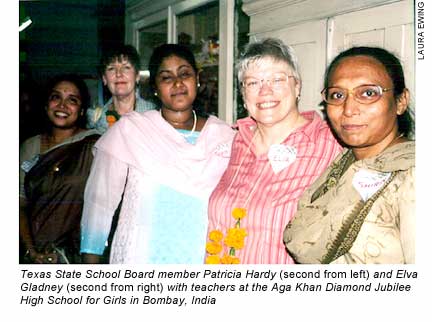 http://www.utexas.edu/supportut/news_pub/yg_islamicstudies.html?AddInterest=1282
http://www.utexas.edu/supportut/news_pub/yg_islamicstudies.html?AddInterest=1282University of Texas at Austin
Updated 2003 November 5
UT Austin Leads
Public School
Educational Effort
 http://www.utexas.edu/supportut/news_pub/yg_islamicstudies.html?AddInterest=1282
http://www.utexas.edu/supportut/news_pub/yg_islamicstudies.html?AddInterest=1282
University of Texas at Austin
Updated 2003 November 5
UT Austin Leads
Public School
Educational Effort
When College of Liberal Arts instructor Elva Gladney visited Zanzibar, Tanzania, and India last summer, she was struck by the friendliness of the Muslim people. Traveling with 18 other educators from all parts of Texas on a quest for greater understanding of Islamic culture, she had many opportunities to interact with local teachers and students.
“The thing that I loved about the trip was the people,” she recalls. “I don't know when I've ever been treated so nicely.” The experience was a reminder that “people are pretty wonderful when you're on a one-to-one basis,” she says.
The trip was sponsored by the Aga Khan Development Network, a group of private, international, non-denominational agencies headquartered in Geneva. The network seeks to improve living conditions and opportunities for people in the developing world. The head of the network is the Aga Khan, a social activist and spiritual leader of the Ismaili community of the Muslim faith, and a direct descendant of the Prophet Muhammad. There are more than 15 million Ismailis living in 25 countries, primarily in Asia, Africa, the Middle East, North America, and Western Europe.
The goal of the summer excursion was to gain greater understanding of the Islamic culture and Muslim people so that the educators can begin to develop a TEKS-based (Texas Essential Knowledge and Skills) public school curriculum on the subject for Texas children. Their work is part of an initiative in the College of Liberal Arts called the Islamic Studies Project. Spearheaded by Dean Richard Lariviere, the project is operating under the umbrella of UTeach, a teacher preparation program in the college.
“We all came back with heart for this effort," Gladney said. "It's very clear that peace in this world depends on people understanding each other.”
The next step is to host a summer institute in July 2004 for 30 world history teachers throughout the state, who will be invited to the University to develop enriched content for Islamic studies. The institutes will be held annually for the following four years to enable educators to assemble a curriculum in world geography and world cultures.
“We want teachers to have a deeper and richer understanding of the Islamic culture so that they can convey it to their students,” Gladney says. The goal is for the curriculum, which will be posted on the college web site, to become a national model.
Tom Kessinger, general manager of the Aga Khan Foundation in Geneva and a longtime friend of Lariviere, points out that the Aga Khan stresses the importance of educating young students because they are the electorate of tomorrow.
"There is a great deal in common between the Muslim and Christian worlds," Kessinger says. "But there is much work to be done in increasing the understanding of this reality."
The Islamic Studies Project was born in discussions between the Aga Khan and Governor Rick Perry a year ago, when the Aga Khan was in Houston for the dedication of a new Ismaili center. Both he and Perry agreed on the need for Texans to have a greater understanding of Islam. Subsequently, UT Austin President Larry Faulkner was asked to join the discussions.
Although the project is in its beginning stages, participating educators have already noticed a change in their own attitudes.
"I agreed to participate hoping that I would gain a greater understanding of Islam and the variety of its interpretations,” says Joe Kieke, a world-history teacher at Hendrickson High School in Pflugerville. “I learned that it is much more varied than our simplified news reports indicate.
“We need to be careful of preconceived notions,” Kieke says. “I want to convey to my students that we are in a period in which we have stereotypical views toward others. The reality is that people are the same everywhere.”
Sheila Allee